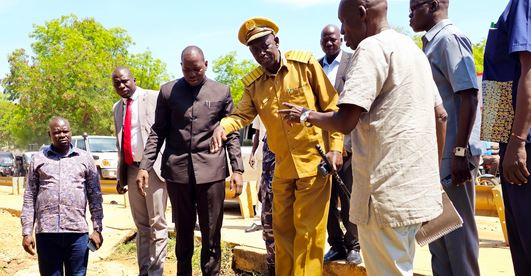Officials from Central Equatoria State led by Deputy Governor Paulino Lukudi, on Wednesday, conducted an on-site inspection to assess the ongoing mitigation efforts to address seasonal flooding at the facility.
Flash floods have recently posed a risk to the airport and the surrounding low-lying areas.
“The airport is the face of our country and as the Government of Central Equatoria State, under the direction of Governor Augustino Jadalla, we have established a Flood Mitigation Committee to assess the levels of flood risk in the state, particularly at the airport,” Lukudu stated.
He assured the public that the assessment indicated no significant flood threats to airport operations, attributing this to infrastructure improvements, including new culverts preventing water from entering airport grounds.
According to the deputy governor, the inspection is part of broader efforts to improve water management across Juba. He said water from Jebel, Gudele, and Munuki areas is being directed to natural streams that flow to the River Nile to ease pressure on the airport and its environs.
“We need to change some of these culverts because they are very small and in the long term, bridges may be necessary to handle the flow,” Lukudu added.
He also highlighted that a new engineering body has been established by the Central Equatoria Government to lead technical collaboration across ministries and other departments to implement Juba’s development plan, which includes expanding the city’s electricity grid and improving drainage infrastructure.
In response to public skepticism regarding tangible outcomes from previous flood assessments, Lukudu assured citizens that the new administration is committed to hands-on governance.
“This is a new administration that is practical in its approach. We cannot promise instant results, but we are action-oriented, and the community will see real changes,” he reassured. “What we need is a complete system to divert water from Jebel to the Nile. Drainage systems are essential in every city. We urge our partners to work with us on this to ensure long-term solutions.”
“Those who build on roadsides and in water pathways must be directed to relocate,” Lukudu added, stating that plans to demolish illegal structures had been postponed due to the rainy season but would resume with community cooperation.

An official at the Juba International Airport, Santino Payol Kuol, recounted previous instances of high water levels, noting that quick actions, such as opening culverts, helped to manage water flow.
“We are working to prevent culverts from being blocked,” Kuol noted, pointing to the potential flood risks posed by encroaching urban development.
For his part, State Minister of Roads Mawa A. Moses echoed the call for a comprehensive approach to Juba’s drainage crisis.
“We need experts to develop a drainage master plan. Our goal is to divert water from high-risk areas, like Jebel, all the way to the Nile. We are asking for support from our partners to build a complete drainage system,” he said. “I am on the demolition committee, and while we paused operations due to the rainy season, we will resume soon.”
According to Mawa, unauthorized buildings in critical areas such as road reserves and graveyards will be cleared.
Meanwhile, the Deputy Mayor for Infrastructure and Environment, Juma Moses Michael, expressed optimism, citing recent equipment support from the Japan International Cooperation Agency (JICA) and plans to launch a city-wide cleaning initiative.
“With new trucks allocated to various city blocks, we are moving toward transforming Juba into a modern, clean city,” he stated. “It is a collective effort with our development partners, state government, and the community.”
UN OCHA Program Officer Yamaha Margaret and other representatives from the humanitarian and development sectors accompanied the state officials on the inspection, emphasizing the importance of keeping the airport operational to facilitate aid.
“The airport provides critical access for humanitarian needs, including the transportation of medical supplies,” noted Margaret. “We are encouraged by the progress on drainage systems to prevent the airport from becoming isolated during floods.”
The officials concluded the visit by calling for increased coordination between government bodies, development partners, and humanitarian organizations to tackle the city’s flooding and infrastructure challenges.




